I always find it most perplexing that the world’s Christian leaders, particularly in the West, do so little on behalf of their fellow Christians who live in the Holy Land. Though the overwhelming majority of Palestinians are Muslims, there has always been and still is a substantial minority of Christians among the Palestinian Arab population. Yet even at Christmas time this small Christian community is pretty much ignored by western Christians.
If they were just ignored it might not be so bad, but even worse for this Christian community is that so many fellow Christians seem to actively want their destruction. In particular the so called Christian Zionist movement in the USA and elsewhere is so devoted to Israel and it Zionist project that they are to all intents and purposes both deaf and blind to the sufferings of Christians in the Holy Land. Of course the trouble for Palestinian Christians is that they are also Arabs and for some Christians to be Arab is more important than being Christian.
Many of the Palestinian Arab Christians live in Israel, yet they too are subjected to the same amount of racist abuse and discrimination as their Muslim Arab kinsmen/women. A particularly nasty, if rather trivial, example of this all pervasive Israeli Jewish racism was seen recently in Nazareth. There the Christian citizens of Nazareth Illit, a predominantly Jewish suburb of Nazareth have been prevented from putting up Christmas trees in the squares of the Arab quarter of the town. The mayor Shimon Gapso denied the request on the grounds that this would be seen by the Jewish majority as provocative. He went on to say, “Nazareth Illit is a Jewish city and it will not happen - not this year and not next year, so long as I am mayor”. How much support did these Christians get from their fellow Christians in the west? Further details can be found here.
It is not just Christian Arabs who are the potential victims of Israeli Jewish racism. Any non-Jew is suspect it seems. Recently two rabbis, Yitzhak Shapira and Yosef Elitzur published a book in which they discuss situations in which religious law allows the killing of non-Jews. It seems that we non-Jews are “uncompassionate by nature” and attacks on us “curb our evil inclination,” while babies and children of Israel’s enemies may be killed since, “it is clear that they will grow to harm us.” I wonder what Christian Zionists make of this vile thinking. More here.
It is of course Palestinians who suffer most from the racist abuse that is alas, becoming all too common in Israel. Another rabbi, David Meir Druckman, also from Nazareth, wants to go on the attack against Palestinians. He told a conference of rabbis, “We need to intimidate the Arabs, so they will flee Upper Nazareth. .... The Arabs must feel as if the Jews have gone mad and it’s impossible to live with them. .... The Arabs should be afraid of us, not the reverse.” Other rabbis have got involved in anti-foreigner activities. Some signed a letter calling on Jewish apartment owners not to rent to foreigners while others called for Jewish women not to date Arabs. More information can be found here and here.
It is not just rabbis who are getting all het up against Palestinians. Ynet reports on the Principal of an integrated school in Jaffa which is attended by both Arab and Jewish children. There the Principal has prohibited Arab students from speaking Arabic inside classrooms. Russian speaking Jews meanwhile are allowed to converse with each other in their native tongue. While Max Blumenthal recounts the exceptionally disturbing account of the abuse hurled at elderly Palestinian women who were on a tour of Yad Vashem. Young Israeli Jews taunted them by calling them whores. His report also highlights the growing rise of racism across Israel.
Perhaps the most depressing development in Israel is its increasing repression of non-violent resistance through arrests, harassment and even summary expulsion without charges or trial. Jeremiah Haber has two detailed reports, here and here, on this oppression. As Haber points out this repression is applied to Jews as well as Arabs. Anyone who opposes the violence of the Zionist state is a likely target for the government and its apparatus. Joseph Dana gives us a report on the arrest, trial and imprisonment of Israeli Jewish activist, Jonathan Pollak, for his peaceful protest, on a bicycle, against the Gaza atrocities. It seems that Israel is beginning to turn against its own Jewish citizens.
The Holy Land is far from being at peace. It would be nice to think that more Christians were willing to use this time of Christmas to offer practical support not just to their fellow Christians, but to all Palestinians who continue to struggle for justice against the might of Israel.























